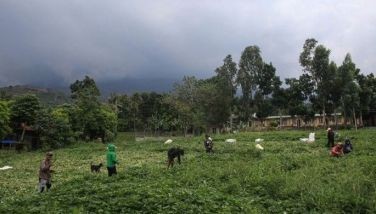Senate to look into Philippine’s agricultural competitiveness

MANILA, Philippines — The Senate committee on agriculture and food is set to conduct an inquiry into the country’s agricultural competitiveness to come up with government interventions to boost farmers’ income while ensuring food security.
The inquiry was called by Sen. Francis Escudero in his Senate Resolution 55, where he cited the need to assess the current state of the agriculture sector, which employs 23.9 percent of the Filipino workforce or about 10.3 million people.
He said hearings will help align laws and policies in order to “stabilize and improve incomes of farmers and fisherfolk, and to make food affordable and accessible to the poor and marginalized sectors,” as well to avoid “diverging, if not competing, public policy directions.”
“Ensuring agricultural competitiveness would require a measured deliberation geared towards determining the most effective government intervention and the most efficient allocation of public funds to achieve the objectives of government,” Escudero said.
He said various agriculture-related laws need to be reviewed, such as Republic Act 8178 (Agricultural Tariffication Act) as amended by RA 10848, RA 11203 or the Rice Tariffication Act and RA 11598 or the Cash Assistance for Filipino Farmers Act, with the end view of determining if these measures are really beneficial to the industry and its workers.
The senator said past administrations have responded to differing priorities in agriculture by adopting a policy of targeted financial infusion to the sector to improve productivity alongside the rescission of quantitative import restrictions on agricultural commodities to reduce food costs.
“Despite financial infusion afforded by agriculture-related interventions, the exposure to global competition has contributed to a significant dependence of the agricultural sector on the international market, not only for foodstuff, but also for agricultural inputs,” he said.
Escudero said the Philippines imported about $15.71 billion worth of agro-based products in 2021, but only exported $6.79 billion of the same. As such, higher agricultural imports relative to exports netted an agricultural trade deficit of $8.92 billion during the same year, which is about 40 percent higher than the $6.37 billion deficit incurred in 2020.
He said the chronic deficit in trade, especially in agricultural commodities, could adversely affect job creation, wage levels and long-term competitiveness of the agricultural sector and its allied industries.
“This adverse effect of import dependence is further aggravated by deep-seated challenges that hinder efforts to realize an inclusive, resilient, sustainable and competitive agricultural sector,” Escudero said.
He said agriculture would be high on his legislative agenda and even called on the new administration to commit P400 billion of the national spending package to the sector and increasing the budget annually over the next six years to make it a robust, resilient and high-growth industry.
“We should all do our part in making our agriculture industry robust. The agriculture sector’s contribution to the country’s gross domestic product (GDP) continues to decline, and we have to stop the trend,” Escudero said.
According to official figures, in 2019 before the onset of the COVID pandemic, the agriculture sector contributed 9.2 percent to the GDP – way below services (60.6 percent) and industries (30.2 percent) – from 2015’s 10.1 percent.
Poverty incidence among farmers was 31.6 percent in 2018, according to the Philippine Statistics Authority, followed by fisherfolk at 26.2 percent.
Farm-to-market roads
A master plan of farm-to-market roads is needed to support the food production and agriculture programs envisioned by President Marcos, Sen. Mark Villar said yesterday.
Villar, a former public works secretary under the Duterte administration, said there is a need to increase farm-to-market roads to ensure agricultural farms will have immediate access and transport of their goods to the market.
The senator, who was in Pagadian City, Zamboanga del Sur for a school speaking engagement, in a briefing lauded Marcos’ Masagana 150 program that provides more productive seedlings to the farmers.
“Aside from the (agricultural) technology, there is a need for support in the infrastructure network to make (the farmers) more efficient,” Villar said. “Because once the farmers become productive, then their income increases and our food prices will decrease.”
According to Villar, there is a need to identify the major farms and thoroughfares in crafting the master plan for farm-to-market roads while immediately rehabilitating existing roads as an initial action to help farmers.
Meanwhile, Villar will also push the Build Build Build act to institutionalize the program and to ensure the continued and efficient implementation of projects.
- Latest
- Trending































